Reading, writing, and math skills are important to learn as well as social skills, teamwork, and technology skills. But there are other skills that children need to become self-sufficient.
Parents can provide this information and schools can offer support when it fits into the curriculum. Let’s look at some of these skills.
How To Find Safe Water
If the electricity goes out, how will you get water?
If your home has a well, then it’s important that household members know how to access this water.
If well water isn’t available and you don’t have bottled water, then you need to know how to filter water so it’s safe to consume. Waterborne pathogens cause annually lots of deaths, hospitalizations, illnesses, and healthcare costs. Boiling water for one minute from nearby sources like a creek, river, or lake will make it safe to drink. Let it cool before using; pour the water into bottles for easy transport or storage.
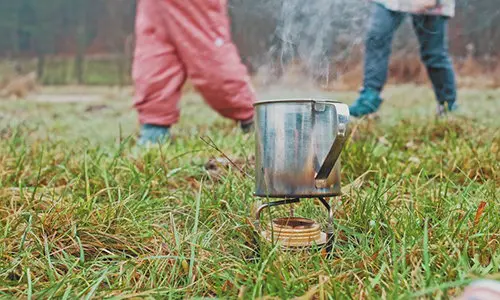
How To Find Shelter To Stay Warm And Dry
If your child needs to find shelter away from home, they can practice building a temporary shelter from tree branches.
If they’re old enough to use a pocket knife, you can teach them how to cut the branches; or, if not, they can break the branches from the tree limbs.
Branches with leaves will offer shelter away from the rain and wind. Leaves or pine needles can be laid down inside the shelter so it’s more comfortable, and other branches, leaves, or bark can be used as a blanket or layered under clothes to keep warm.
Related: 50 Movies That Will Teach You A Lot About Survival

How To Build A Fire
Building a fire can save your life, provide warmth, and be a source for cooking food. It’s best to learn how to start a fire properly so it’s kept under control.
First, round up dry bits of grass, pine, moss, lichen, and leaves to start before adding kindling (small dry twigs and branches) to burn easily, and then add wood. There should be no overhanging branches where you have the fire and about a 10-foot circumference of a clearing. Digging a small one-foot-deep pit is helpful to contain the fire. If there are rocks in the area, you can arrange them around the pit.
After the fire starts with a lighter or match, larger branches and logs can be added. A shovel and bucket are helpful to put out the fire. Toss some dirt from the bucket and stir the fire with the shovel. The fire should be cold before leaving the site. If there is still heat coming from the “fire”, then continue to pour dirt on the fire and stir the area.
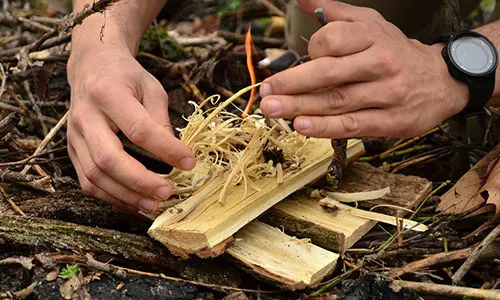
How To Use A Knife Safely
It’s important to know how to hold, carry, and use a knife properly if needed to build a shelter, hunt, skin, a fish, etc.
There are many ways to hold a knife. One way is with the handle grip. Your entire hand grips the handle behind the bolster (the area where the blade meets the handle). Another method is called the blade or pinch grip. Your thumb and forefinger rest against the blade in front of the bolster; the middle, ring, and pinky finger wrap around the blade.
How To Swim
Swimming is a very popular activity for children and adolescents so it’s imperative they learn how to tread water, float, and swim a considerable distance.
This will help if they’re in a life-threatening situation where they need to swim. Plus, swimming skills will most likely help your child enjoy water sports more and build their confidence in and around water.
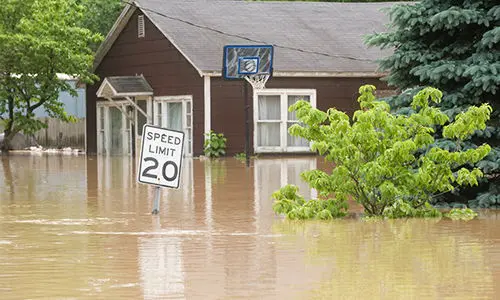
Basic First Aid
Your child should know where the first aid supplies are kept and how to treat such things as minor cuts and burns. They also need to know which injuries are more serious and need the doctor’s attention.
Basic Self-Defense
Children need to know not to talk to strangers and to get away if someone grabs them. They should push toward the person instead of pulling away. If someone grabs them by the wrist, they can jerk in the direction of the other person’s fingers. If their fingers are pointed down, then they should jerk their hands down.
Related: 25 Things We Did as Kids That Would Get Someone Arrested Today
How To Sew
Threading a needle, sewing a button, and darning a hole are basic sewing skills that children can learn. After mending clothes, they can learn to make a blanket by stitching smaller pieces of material together.
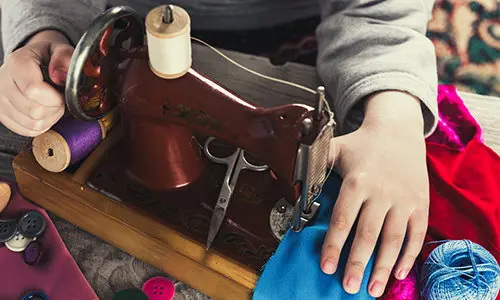
How To Read A Map And Use A Compass
If the power is gone, it’s essential to know how to use a map (that isn’t on a phone). They should be able to look at a map and find their way back to safety. Simple compass coordinates should be reviewed and that can assist them.
Know Where Family And Friends Reside
Memorizing addresses is one thing but it’s necessary to know how to get to safe homes should they need to find one. If the power is gone, then their GPS won’t work. Practice walking to homes where your child will be welcome and safe during any emergency.
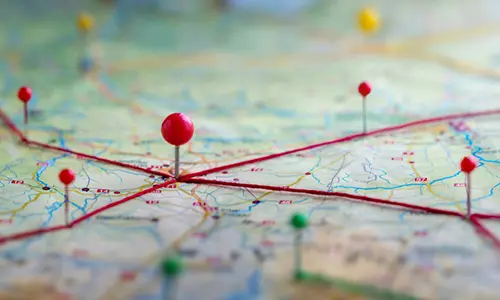
What To Do In Inclement Weather
Your child’s school most likely practices tornado drills. Conduct drills at home. Remind them to stay away from windows and go to the basement. If there isn’t a basement, designate an interior room or hallway on the lowest level of the building.
Vehicle Maintenance
When your child gets older, teach them how to check and top off fluids including oil, how to change a flat tire, and how to replace windshield wipers, etc.
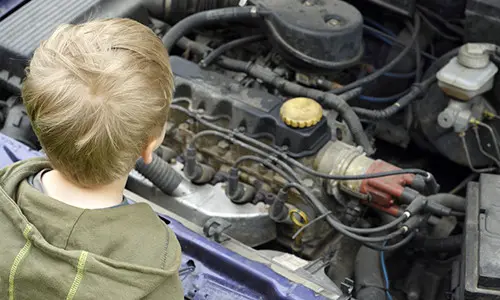
Climbing A Tree
Show them how to climb safely and alert them when a distance is too high to climb. Climbing can be useful to get away from predators, or it can be used to get your directional bearings.
Gardening
Start with container gardening and high-producing plants like cherry tomatoes, green beans, peppers, or strawberries. Learn about soil, water, and harvesting. Move on to different plants that your child prefers or those that do well in the area.
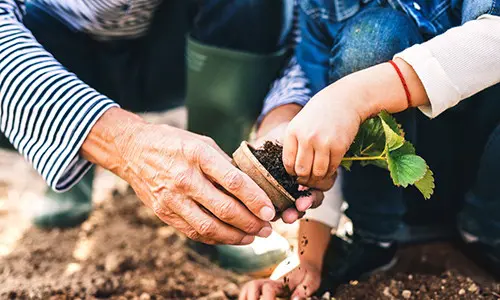
How To Fish
Tying on a fishhook, putting on bait, and taking off fish are pretty easy skills to learn. Combine those skills with casting and you are all set. Fishing may come in handy if you need to rely on fish to eat in a survival situation.
Local Edible And Medicinal Plant Knowledge
To avoid poisonous look-alikes, teach those plants that aren’t like berries (blackberries, blueberries, raspberries, and strawberries), nettle, watercress, dandelions, and cattails. Gradually add more plants native to your area. Look for recipes and study the benefits of each of the plants.
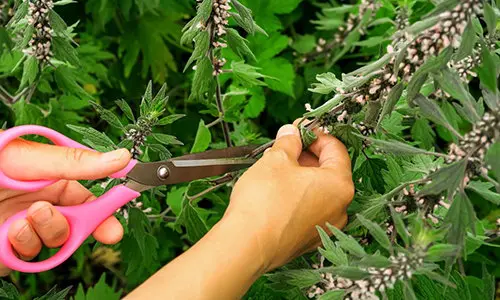
Opening A Can With/Without A Can Opener
First, master using a can opener with various sizes of cans. Then move on to showing your child how to open a can without a can opener.
One way is to rub the metal can on a large rock or cement.
How To Signal For Help (SOS)
There are some simple ways to signal for help in a life-threatening situation. You can spell out the letters SOS with rocks or use 3 large X marks in the shape of a triangle.
Or you can write the letters in the sand. Another way is to use the Morse code with a flashlight or the light of a mobile phone. Produce 3 short flashes, then 3 long flashes, then 3 short flashes
Use The GPS Function On The Phone
Despite a cell phone not always being available or working if there should be an outage, kids can learn how to navigate to home, the police station, the hospital, to “safe” homes of friends and family, etc. while using the phone and typing in addresses.
There are many survival skills that can be taught to your children.
These capabilities are important for taking care of themselves for a few days should a situation arise.
Although we don’t know what is in store for us, these skills provide a foundation to build much-needed confidence and a skill level to thrive in emergency situations. What other skill would you add to this list? Let us know in the Comments section.
You may also like:
 Do You Have An Escape Plan For Your House?
Do You Have An Escape Plan For Your House?
The Lost Remedies of Our Grandparents That You Should Still Have at Home (Video)
How To Prepare Your House In Case Of An Emergency
The Indispensable Medicinal Garden Every Homestead Should Have
15 Things You Should Teach Your Children That Can Save Their Lives

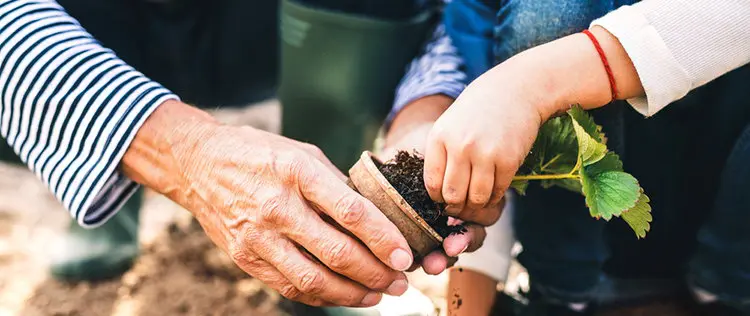








Good morning, good morning! Great article and suggestions.
I would also add to teach them how to hide (crazy stuff happening nowadays, so be smart), how to keep pushing, when everyone else stops (be consistent with a fighter attitude) and also financial/economic wisdom (but I guess that the government doesn’t want to teach us these things, so we can still depend on them).
LOL, of course they don’t want financial freedom and knowledge for our children… the country wouldn’t run (like they want) without them being in control.
I started to teach my children what money actually is when they were 7 and 8; and some basic survival skills when they were 5. All good now!